The Role of Key Leadership Traits in Achieving Organizational Success
VerifiedAdded on 2020/03/04
|9
|2102
|266
Essay
AI Summary
This essay explores the critical leadership traits that contribute to organizational success. It categorizes these traits into general personality traits (self-confidence, humility, core self-evaluation, trustworthiness, authenticity, extraversion, assertiveness, enthusiasm, optimism, warmth, and a sense of humor) and task-related personality traits (proactive personality, passion, emotional intelligence, flexibility, and courage). The essay also discusses leadership motives, including power motives (personalized and socialized) and drive and achievement motives, as well as the importance of tenacity, resilience, effectiveness, mentorship, vision, commitment, proper treatment of people, learning from mistakes, self-assessment, sharp perception, responsiveness to group needs, and knowledge of the organization. The analysis highlights how these traits and motives collectively shape effective leadership and drive organizational success. Desklib offers a wide array of study tools and resources for students.
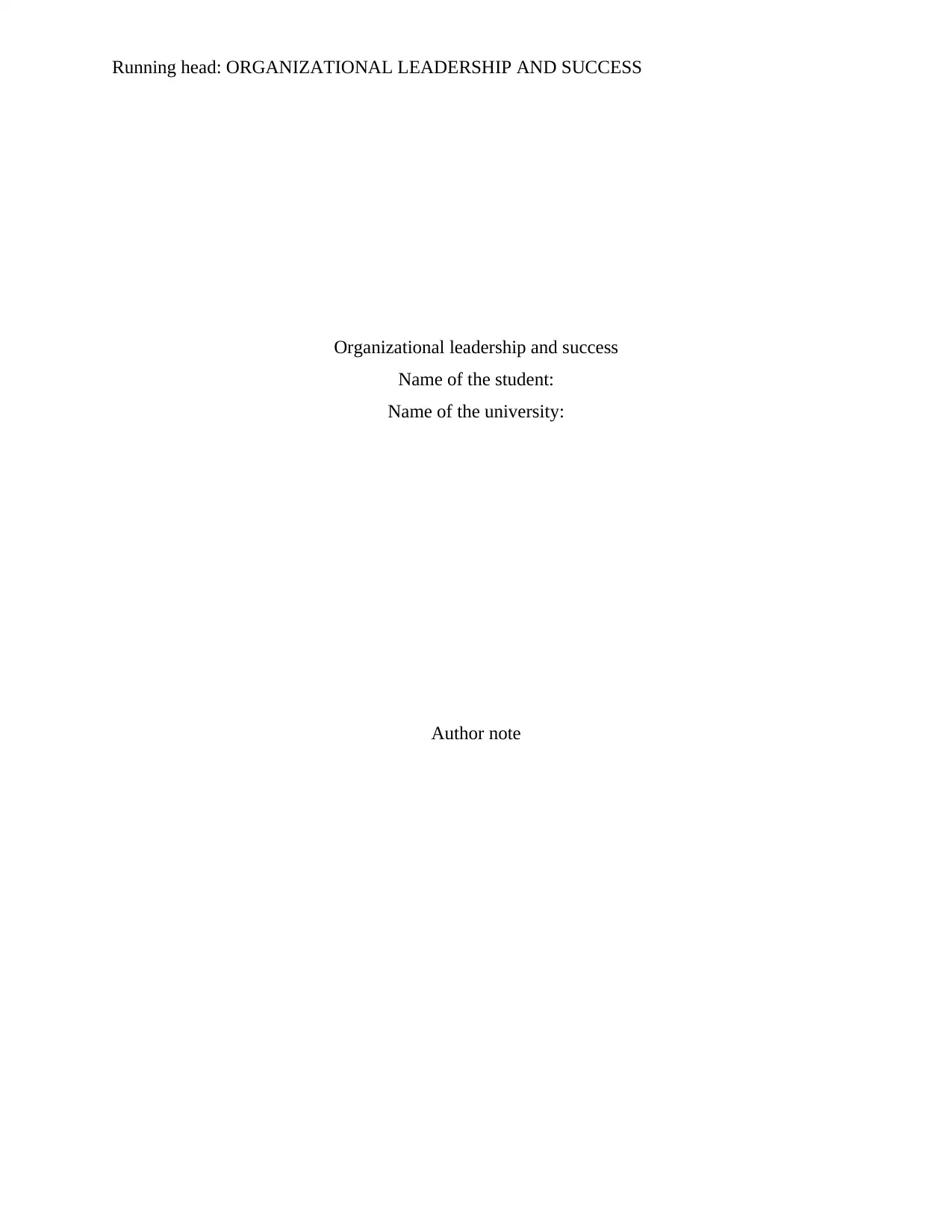
Running head: ORGANIZATIONAL LEADERSHIP AND SUCCESS
Organizational leadership and success
Name of the student:
Name of the university:
Author note
Organizational leadership and success
Name of the student:
Name of the university:
Author note
Paraphrase This Document
Need a fresh take? Get an instant paraphrase of this document with our AI Paraphraser
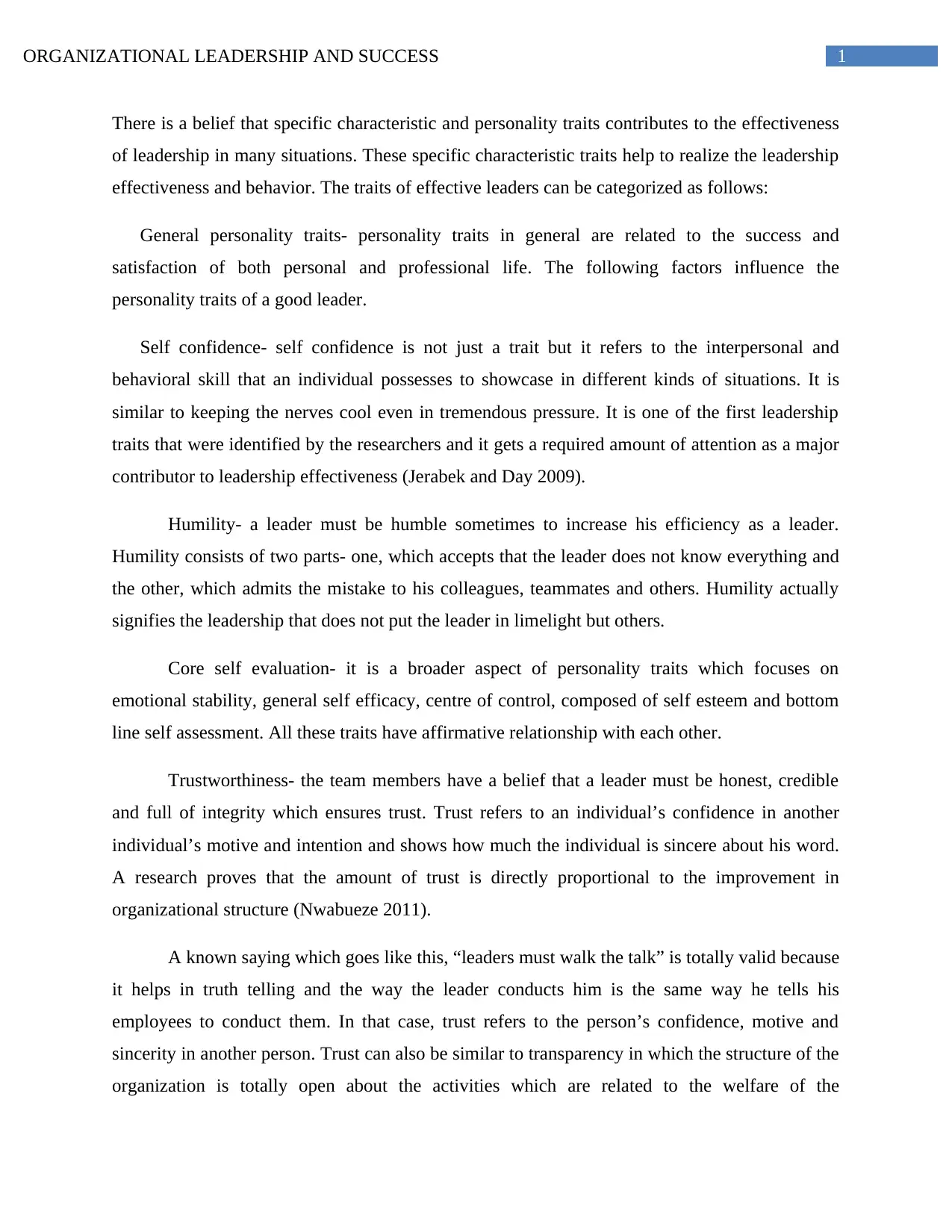
1ORGANIZATIONAL LEADERSHIP AND SUCCESS
There is a belief that specific characteristic and personality traits contributes to the effectiveness
of leadership in many situations. These specific characteristic traits help to realize the leadership
effectiveness and behavior. The traits of effective leaders can be categorized as follows:
General personality traits- personality traits in general are related to the success and
satisfaction of both personal and professional life. The following factors influence the
personality traits of a good leader.
Self confidence- self confidence is not just a trait but it refers to the interpersonal and
behavioral skill that an individual possesses to showcase in different kinds of situations. It is
similar to keeping the nerves cool even in tremendous pressure. It is one of the first leadership
traits that were identified by the researchers and it gets a required amount of attention as a major
contributor to leadership effectiveness (Jerabek and Day 2009).
Humility- a leader must be humble sometimes to increase his efficiency as a leader.
Humility consists of two parts- one, which accepts that the leader does not know everything and
the other, which admits the mistake to his colleagues, teammates and others. Humility actually
signifies the leadership that does not put the leader in limelight but others.
Core self evaluation- it is a broader aspect of personality traits which focuses on
emotional stability, general self efficacy, centre of control, composed of self esteem and bottom
line self assessment. All these traits have affirmative relationship with each other.
Trustworthiness- the team members have a belief that a leader must be honest, credible
and full of integrity which ensures trust. Trust refers to an individual’s confidence in another
individual’s motive and intention and shows how much the individual is sincere about his word.
A research proves that the amount of trust is directly proportional to the improvement in
organizational structure (Nwabueze 2011).
A known saying which goes like this, “leaders must walk the talk” is totally valid because
it helps in truth telling and the way the leader conducts him is the same way he tells his
employees to conduct them. In that case, trust refers to the person’s confidence, motive and
sincerity in another person. Trust can also be similar to transparency in which the structure of the
organization is totally open about the activities which are related to the welfare of the
There is a belief that specific characteristic and personality traits contributes to the effectiveness
of leadership in many situations. These specific characteristic traits help to realize the leadership
effectiveness and behavior. The traits of effective leaders can be categorized as follows:
General personality traits- personality traits in general are related to the success and
satisfaction of both personal and professional life. The following factors influence the
personality traits of a good leader.
Self confidence- self confidence is not just a trait but it refers to the interpersonal and
behavioral skill that an individual possesses to showcase in different kinds of situations. It is
similar to keeping the nerves cool even in tremendous pressure. It is one of the first leadership
traits that were identified by the researchers and it gets a required amount of attention as a major
contributor to leadership effectiveness (Jerabek and Day 2009).
Humility- a leader must be humble sometimes to increase his efficiency as a leader.
Humility consists of two parts- one, which accepts that the leader does not know everything and
the other, which admits the mistake to his colleagues, teammates and others. Humility actually
signifies the leadership that does not put the leader in limelight but others.
Core self evaluation- it is a broader aspect of personality traits which focuses on
emotional stability, general self efficacy, centre of control, composed of self esteem and bottom
line self assessment. All these traits have affirmative relationship with each other.
Trustworthiness- the team members have a belief that a leader must be honest, credible
and full of integrity which ensures trust. Trust refers to an individual’s confidence in another
individual’s motive and intention and shows how much the individual is sincere about his word.
A research proves that the amount of trust is directly proportional to the improvement in
organizational structure (Nwabueze 2011).
A known saying which goes like this, “leaders must walk the talk” is totally valid because
it helps in truth telling and the way the leader conducts him is the same way he tells his
employees to conduct them. In that case, trust refers to the person’s confidence, motive and
sincerity in another person. Trust can also be similar to transparency in which the structure of the
organization is totally open about the activities which are related to the welfare of the
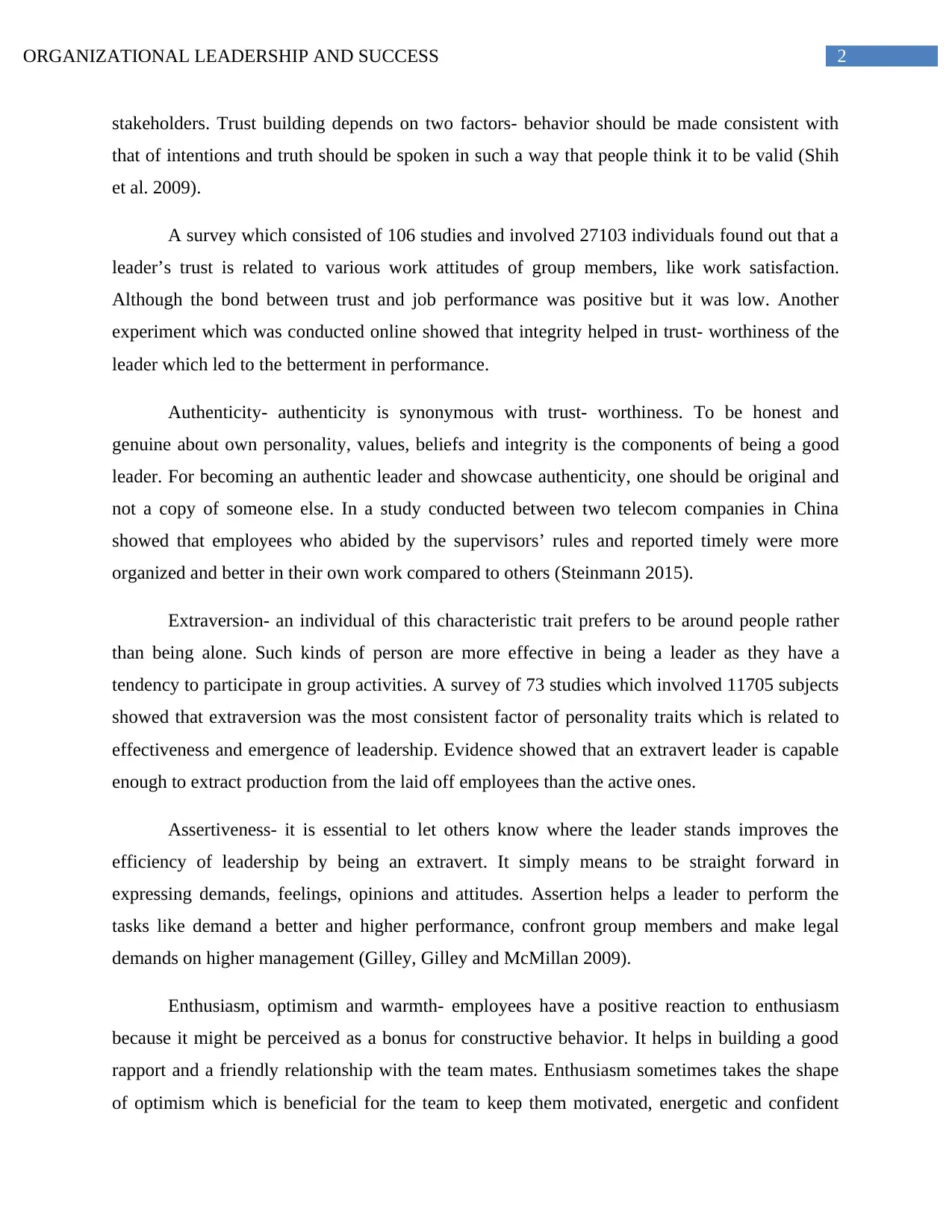
2ORGANIZATIONAL LEADERSHIP AND SUCCESS
stakeholders. Trust building depends on two factors- behavior should be made consistent with
that of intentions and truth should be spoken in such a way that people think it to be valid (Shih
et al. 2009).
A survey which consisted of 106 studies and involved 27103 individuals found out that a
leader’s trust is related to various work attitudes of group members, like work satisfaction.
Although the bond between trust and job performance was positive but it was low. Another
experiment which was conducted online showed that integrity helped in trust- worthiness of the
leader which led to the betterment in performance.
Authenticity- authenticity is synonymous with trust- worthiness. To be honest and
genuine about own personality, values, beliefs and integrity is the components of being a good
leader. For becoming an authentic leader and showcase authenticity, one should be original and
not a copy of someone else. In a study conducted between two telecom companies in China
showed that employees who abided by the supervisors’ rules and reported timely were more
organized and better in their own work compared to others (Steinmann 2015).
Extraversion- an individual of this characteristic trait prefers to be around people rather
than being alone. Such kinds of person are more effective in being a leader as they have a
tendency to participate in group activities. A survey of 73 studies which involved 11705 subjects
showed that extraversion was the most consistent factor of personality traits which is related to
effectiveness and emergence of leadership. Evidence showed that an extravert leader is capable
enough to extract production from the laid off employees than the active ones.
Assertiveness- it is essential to let others know where the leader stands improves the
efficiency of leadership by being an extravert. It simply means to be straight forward in
expressing demands, feelings, opinions and attitudes. Assertion helps a leader to perform the
tasks like demand a better and higher performance, confront group members and make legal
demands on higher management (Gilley, Gilley and McMillan 2009).
Enthusiasm, optimism and warmth- employees have a positive reaction to enthusiasm
because it might be perceived as a bonus for constructive behavior. It helps in building a good
rapport and a friendly relationship with the team mates. Enthusiasm sometimes takes the shape
of optimism which is beneficial for the team to keep them motivated, energetic and confident
stakeholders. Trust building depends on two factors- behavior should be made consistent with
that of intentions and truth should be spoken in such a way that people think it to be valid (Shih
et al. 2009).
A survey which consisted of 106 studies and involved 27103 individuals found out that a
leader’s trust is related to various work attitudes of group members, like work satisfaction.
Although the bond between trust and job performance was positive but it was low. Another
experiment which was conducted online showed that integrity helped in trust- worthiness of the
leader which led to the betterment in performance.
Authenticity- authenticity is synonymous with trust- worthiness. To be honest and
genuine about own personality, values, beliefs and integrity is the components of being a good
leader. For becoming an authentic leader and showcase authenticity, one should be original and
not a copy of someone else. In a study conducted between two telecom companies in China
showed that employees who abided by the supervisors’ rules and reported timely were more
organized and better in their own work compared to others (Steinmann 2015).
Extraversion- an individual of this characteristic trait prefers to be around people rather
than being alone. Such kinds of person are more effective in being a leader as they have a
tendency to participate in group activities. A survey of 73 studies which involved 11705 subjects
showed that extraversion was the most consistent factor of personality traits which is related to
effectiveness and emergence of leadership. Evidence showed that an extravert leader is capable
enough to extract production from the laid off employees than the active ones.
Assertiveness- it is essential to let others know where the leader stands improves the
efficiency of leadership by being an extravert. It simply means to be straight forward in
expressing demands, feelings, opinions and attitudes. Assertion helps a leader to perform the
tasks like demand a better and higher performance, confront group members and make legal
demands on higher management (Gilley, Gilley and McMillan 2009).
Enthusiasm, optimism and warmth- employees have a positive reaction to enthusiasm
because it might be perceived as a bonus for constructive behavior. It helps in building a good
rapport and a friendly relationship with the team mates. Enthusiasm sometimes takes the shape
of optimism which is beneficial for the team to keep them motivated, energetic and confident
⊘ This is a preview!⊘
Do you want full access?
Subscribe today to unlock all pages.

Trusted by 1+ million students worldwide
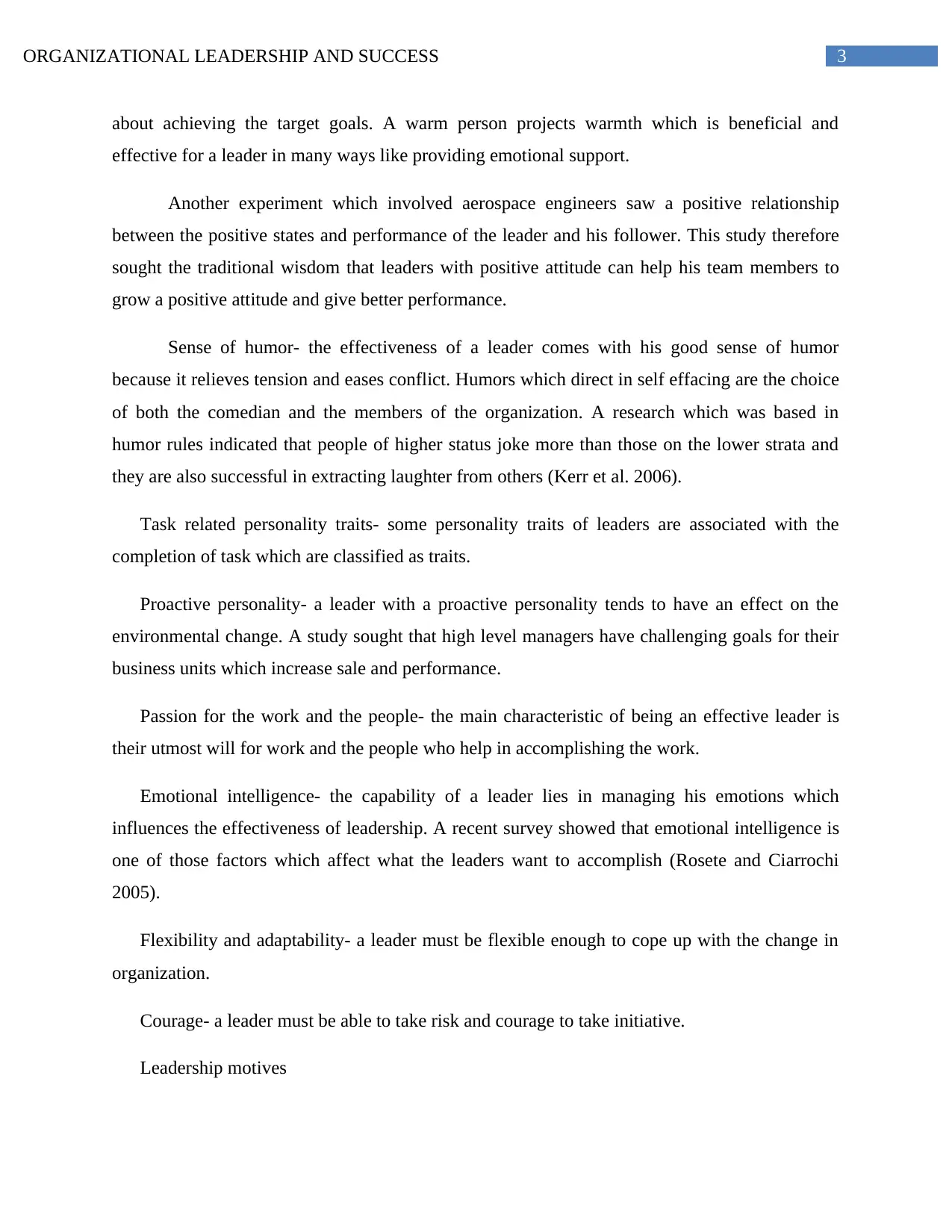
3ORGANIZATIONAL LEADERSHIP AND SUCCESS
about achieving the target goals. A warm person projects warmth which is beneficial and
effective for a leader in many ways like providing emotional support.
Another experiment which involved aerospace engineers saw a positive relationship
between the positive states and performance of the leader and his follower. This study therefore
sought the traditional wisdom that leaders with positive attitude can help his team members to
grow a positive attitude and give better performance.
Sense of humor- the effectiveness of a leader comes with his good sense of humor
because it relieves tension and eases conflict. Humors which direct in self effacing are the choice
of both the comedian and the members of the organization. A research which was based in
humor rules indicated that people of higher status joke more than those on the lower strata and
they are also successful in extracting laughter from others (Kerr et al. 2006).
Task related personality traits- some personality traits of leaders are associated with the
completion of task which are classified as traits.
Proactive personality- a leader with a proactive personality tends to have an effect on the
environmental change. A study sought that high level managers have challenging goals for their
business units which increase sale and performance.
Passion for the work and the people- the main characteristic of being an effective leader is
their utmost will for work and the people who help in accomplishing the work.
Emotional intelligence- the capability of a leader lies in managing his emotions which
influences the effectiveness of leadership. A recent survey showed that emotional intelligence is
one of those factors which affect what the leaders want to accomplish (Rosete and Ciarrochi
2005).
Flexibility and adaptability- a leader must be flexible enough to cope up with the change in
organization.
Courage- a leader must be able to take risk and courage to take initiative.
Leadership motives
about achieving the target goals. A warm person projects warmth which is beneficial and
effective for a leader in many ways like providing emotional support.
Another experiment which involved aerospace engineers saw a positive relationship
between the positive states and performance of the leader and his follower. This study therefore
sought the traditional wisdom that leaders with positive attitude can help his team members to
grow a positive attitude and give better performance.
Sense of humor- the effectiveness of a leader comes with his good sense of humor
because it relieves tension and eases conflict. Humors which direct in self effacing are the choice
of both the comedian and the members of the organization. A research which was based in
humor rules indicated that people of higher status joke more than those on the lower strata and
they are also successful in extracting laughter from others (Kerr et al. 2006).
Task related personality traits- some personality traits of leaders are associated with the
completion of task which are classified as traits.
Proactive personality- a leader with a proactive personality tends to have an effect on the
environmental change. A study sought that high level managers have challenging goals for their
business units which increase sale and performance.
Passion for the work and the people- the main characteristic of being an effective leader is
their utmost will for work and the people who help in accomplishing the work.
Emotional intelligence- the capability of a leader lies in managing his emotions which
influences the effectiveness of leadership. A recent survey showed that emotional intelligence is
one of those factors which affect what the leaders want to accomplish (Rosete and Ciarrochi
2005).
Flexibility and adaptability- a leader must be flexible enough to cope up with the change in
organization.
Courage- a leader must be able to take risk and courage to take initiative.
Leadership motives
Paraphrase This Document
Need a fresh take? Get an instant paraphrase of this document with our AI Paraphraser
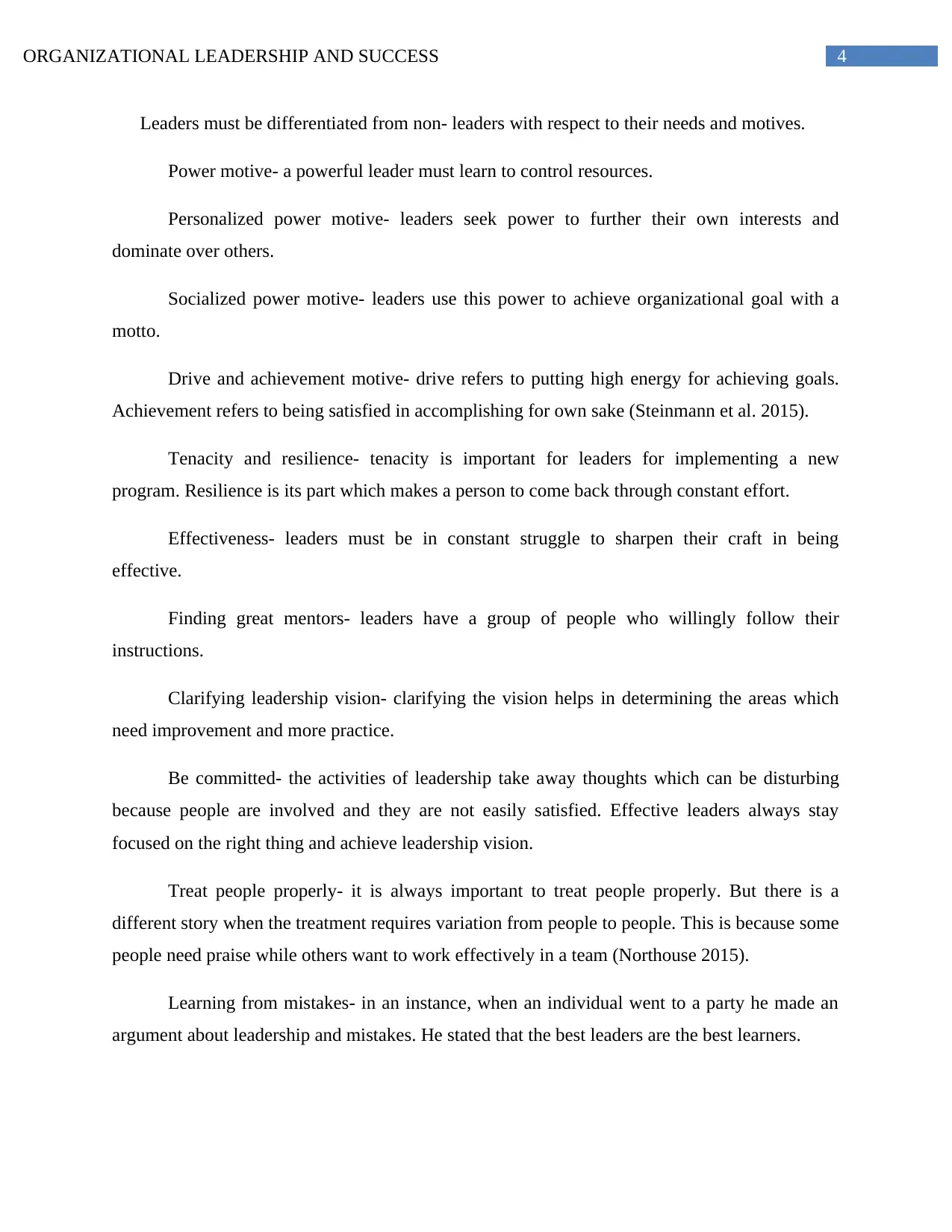
4ORGANIZATIONAL LEADERSHIP AND SUCCESS
Leaders must be differentiated from non- leaders with respect to their needs and motives.
Power motive- a powerful leader must learn to control resources.
Personalized power motive- leaders seek power to further their own interests and
dominate over others.
Socialized power motive- leaders use this power to achieve organizational goal with a
motto.
Drive and achievement motive- drive refers to putting high energy for achieving goals.
Achievement refers to being satisfied in accomplishing for own sake (Steinmann et al. 2015).
Tenacity and resilience- tenacity is important for leaders for implementing a new
program. Resilience is its part which makes a person to come back through constant effort.
Effectiveness- leaders must be in constant struggle to sharpen their craft in being
effective.
Finding great mentors- leaders have a group of people who willingly follow their
instructions.
Clarifying leadership vision- clarifying the vision helps in determining the areas which
need improvement and more practice.
Be committed- the activities of leadership take away thoughts which can be disturbing
because people are involved and they are not easily satisfied. Effective leaders always stay
focused on the right thing and achieve leadership vision.
Treat people properly- it is always important to treat people properly. But there is a
different story when the treatment requires variation from people to people. This is because some
people need praise while others want to work effectively in a team (Northouse 2015).
Learning from mistakes- in an instance, when an individual went to a party he made an
argument about leadership and mistakes. He stated that the best leaders are the best learners.
Leaders must be differentiated from non- leaders with respect to their needs and motives.
Power motive- a powerful leader must learn to control resources.
Personalized power motive- leaders seek power to further their own interests and
dominate over others.
Socialized power motive- leaders use this power to achieve organizational goal with a
motto.
Drive and achievement motive- drive refers to putting high energy for achieving goals.
Achievement refers to being satisfied in accomplishing for own sake (Steinmann et al. 2015).
Tenacity and resilience- tenacity is important for leaders for implementing a new
program. Resilience is its part which makes a person to come back through constant effort.
Effectiveness- leaders must be in constant struggle to sharpen their craft in being
effective.
Finding great mentors- leaders have a group of people who willingly follow their
instructions.
Clarifying leadership vision- clarifying the vision helps in determining the areas which
need improvement and more practice.
Be committed- the activities of leadership take away thoughts which can be disturbing
because people are involved and they are not easily satisfied. Effective leaders always stay
focused on the right thing and achieve leadership vision.
Treat people properly- it is always important to treat people properly. But there is a
different story when the treatment requires variation from people to people. This is because some
people need praise while others want to work effectively in a team (Northouse 2015).
Learning from mistakes- in an instance, when an individual went to a party he made an
argument about leadership and mistakes. He stated that the best leaders are the best learners.
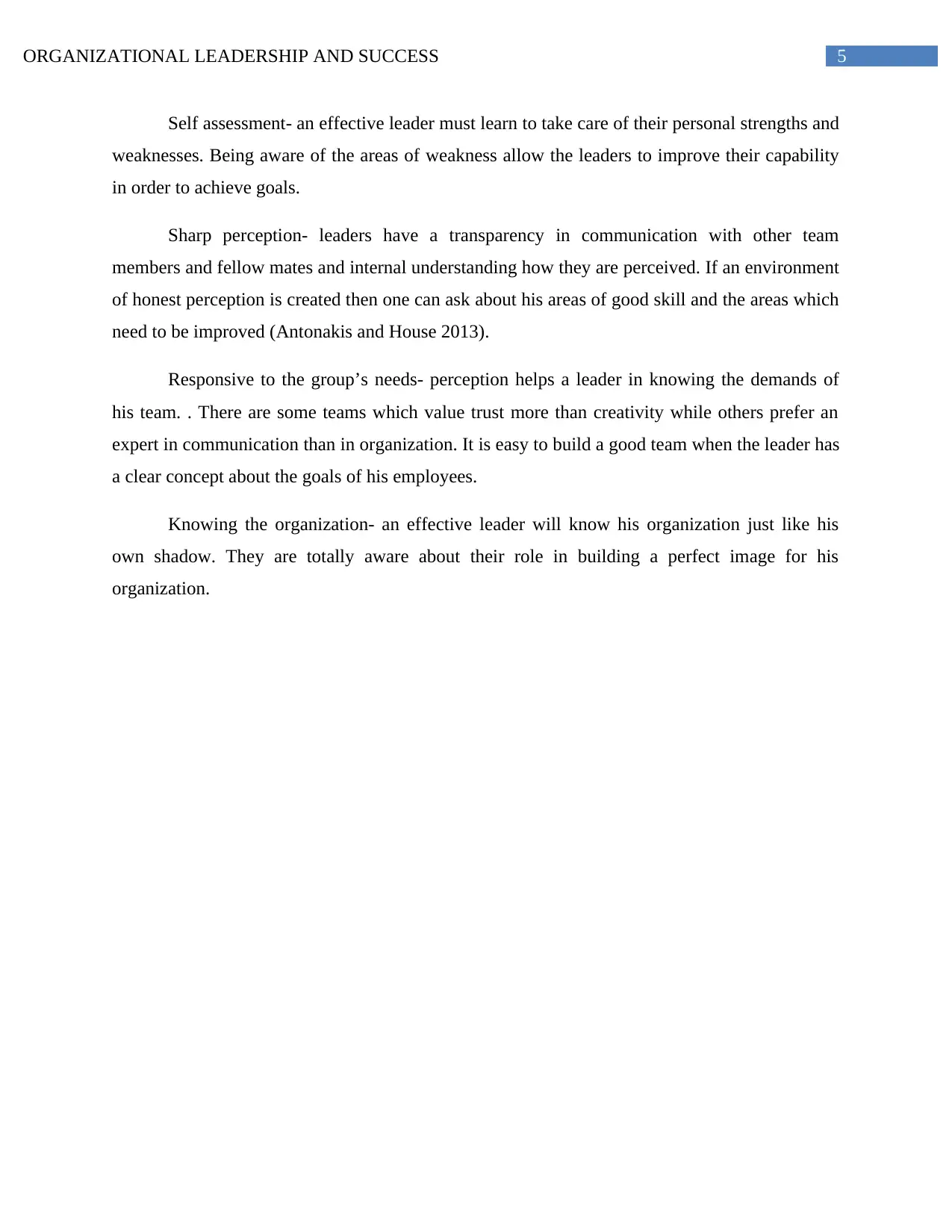
5ORGANIZATIONAL LEADERSHIP AND SUCCESS
Self assessment- an effective leader must learn to take care of their personal strengths and
weaknesses. Being aware of the areas of weakness allow the leaders to improve their capability
in order to achieve goals.
Sharp perception- leaders have a transparency in communication with other team
members and fellow mates and internal understanding how they are perceived. If an environment
of honest perception is created then one can ask about his areas of good skill and the areas which
need to be improved (Antonakis and House 2013).
Responsive to the group’s needs- perception helps a leader in knowing the demands of
his team. . There are some teams which value trust more than creativity while others prefer an
expert in communication than in organization. It is easy to build a good team when the leader has
a clear concept about the goals of his employees.
Knowing the organization- an effective leader will know his organization just like his
own shadow. They are totally aware about their role in building a perfect image for his
organization.
Self assessment- an effective leader must learn to take care of their personal strengths and
weaknesses. Being aware of the areas of weakness allow the leaders to improve their capability
in order to achieve goals.
Sharp perception- leaders have a transparency in communication with other team
members and fellow mates and internal understanding how they are perceived. If an environment
of honest perception is created then one can ask about his areas of good skill and the areas which
need to be improved (Antonakis and House 2013).
Responsive to the group’s needs- perception helps a leader in knowing the demands of
his team. . There are some teams which value trust more than creativity while others prefer an
expert in communication than in organization. It is easy to build a good team when the leader has
a clear concept about the goals of his employees.
Knowing the organization- an effective leader will know his organization just like his
own shadow. They are totally aware about their role in building a perfect image for his
organization.
⊘ This is a preview!⊘
Do you want full access?
Subscribe today to unlock all pages.

Trusted by 1+ million students worldwide
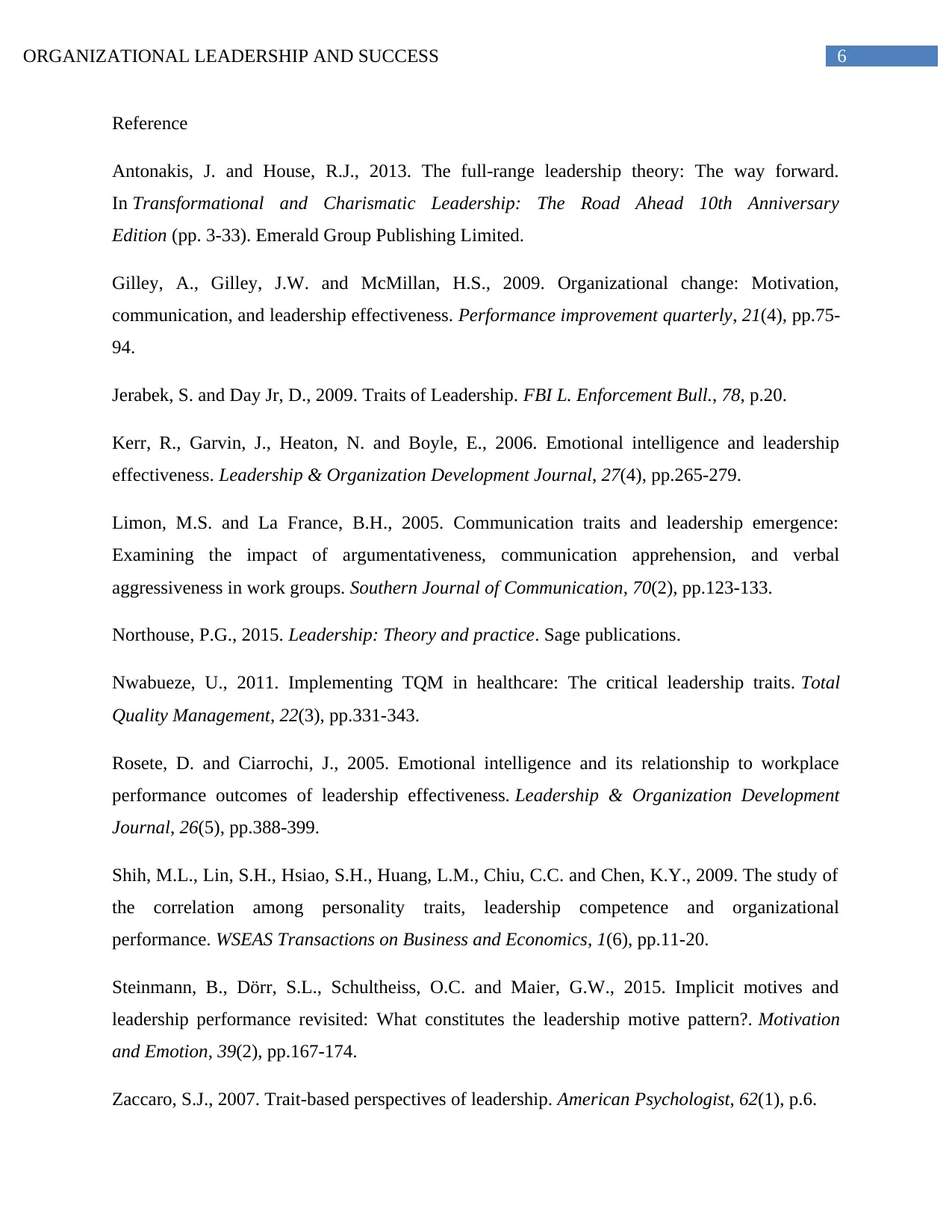
6ORGANIZATIONAL LEADERSHIP AND SUCCESS
Reference
Antonakis, J. and House, R.J., 2013. The full-range leadership theory: The way forward.
In Transformational and Charismatic Leadership: The Road Ahead 10th Anniversary
Edition (pp. 3-33). Emerald Group Publishing Limited.
Gilley, A., Gilley, J.W. and McMillan, H.S., 2009. Organizational change: Motivation,
communication, and leadership effectiveness. Performance improvement quarterly, 21(4), pp.75-
94.
Jerabek, S. and Day Jr, D., 2009. Traits of Leadership. FBI L. Enforcement Bull., 78, p.20.
Kerr, R., Garvin, J., Heaton, N. and Boyle, E., 2006. Emotional intelligence and leadership
effectiveness. Leadership & Organization Development Journal, 27(4), pp.265-279.
Limon, M.S. and La France, B.H., 2005. Communication traits and leadership emergence:
Examining the impact of argumentativeness, communication apprehension, and verbal
aggressiveness in work groups. Southern Journal of Communication, 70(2), pp.123-133.
Northouse, P.G., 2015. Leadership: Theory and practice. Sage publications.
Nwabueze, U., 2011. Implementing TQM in healthcare: The critical leadership traits. Total
Quality Management, 22(3), pp.331-343.
Rosete, D. and Ciarrochi, J., 2005. Emotional intelligence and its relationship to workplace
performance outcomes of leadership effectiveness. Leadership & Organization Development
Journal, 26(5), pp.388-399.
Shih, M.L., Lin, S.H., Hsiao, S.H., Huang, L.M., Chiu, C.C. and Chen, K.Y., 2009. The study of
the correlation among personality traits, leadership competence and organizational
performance. WSEAS Transactions on Business and Economics, 1(6), pp.11-20.
Steinmann, B., Dörr, S.L., Schultheiss, O.C. and Maier, G.W., 2015. Implicit motives and
leadership performance revisited: What constitutes the leadership motive pattern?. Motivation
and Emotion, 39(2), pp.167-174.
Zaccaro, S.J., 2007. Trait-based perspectives of leadership. American Psychologist, 62(1), p.6.
Reference
Antonakis, J. and House, R.J., 2013. The full-range leadership theory: The way forward.
In Transformational and Charismatic Leadership: The Road Ahead 10th Anniversary
Edition (pp. 3-33). Emerald Group Publishing Limited.
Gilley, A., Gilley, J.W. and McMillan, H.S., 2009. Organizational change: Motivation,
communication, and leadership effectiveness. Performance improvement quarterly, 21(4), pp.75-
94.
Jerabek, S. and Day Jr, D., 2009. Traits of Leadership. FBI L. Enforcement Bull., 78, p.20.
Kerr, R., Garvin, J., Heaton, N. and Boyle, E., 2006. Emotional intelligence and leadership
effectiveness. Leadership & Organization Development Journal, 27(4), pp.265-279.
Limon, M.S. and La France, B.H., 2005. Communication traits and leadership emergence:
Examining the impact of argumentativeness, communication apprehension, and verbal
aggressiveness in work groups. Southern Journal of Communication, 70(2), pp.123-133.
Northouse, P.G., 2015. Leadership: Theory and practice. Sage publications.
Nwabueze, U., 2011. Implementing TQM in healthcare: The critical leadership traits. Total
Quality Management, 22(3), pp.331-343.
Rosete, D. and Ciarrochi, J., 2005. Emotional intelligence and its relationship to workplace
performance outcomes of leadership effectiveness. Leadership & Organization Development
Journal, 26(5), pp.388-399.
Shih, M.L., Lin, S.H., Hsiao, S.H., Huang, L.M., Chiu, C.C. and Chen, K.Y., 2009. The study of
the correlation among personality traits, leadership competence and organizational
performance. WSEAS Transactions on Business and Economics, 1(6), pp.11-20.
Steinmann, B., Dörr, S.L., Schultheiss, O.C. and Maier, G.W., 2015. Implicit motives and
leadership performance revisited: What constitutes the leadership motive pattern?. Motivation
and Emotion, 39(2), pp.167-174.
Zaccaro, S.J., 2007. Trait-based perspectives of leadership. American Psychologist, 62(1), p.6.
Paraphrase This Document
Need a fresh take? Get an instant paraphrase of this document with our AI Paraphraser

7ORGANIZATIONAL LEADERSHIP AND SUCCESS
Zaccaro, S.J., 2007. Trait-based perspectives of leadership. American Psychologist, 62(1), p.6.
Zaccaro, S.J., 2007. Trait-based perspectives of leadership. American Psychologist, 62(1), p.6.

8ORGANIZATIONAL LEADERSHIP AND SUCCESS
⊘ This is a preview!⊘
Do you want full access?
Subscribe today to unlock all pages.

Trusted by 1+ million students worldwide
1 out of 9
Related Documents
Your All-in-One AI-Powered Toolkit for Academic Success.
+13062052269
info@desklib.com
Available 24*7 on WhatsApp / Email
![[object Object]](/_next/static/media/star-bottom.7253800d.svg)
Unlock your academic potential
Copyright © 2020–2026 A2Z Services. All Rights Reserved. Developed and managed by ZUCOL.





